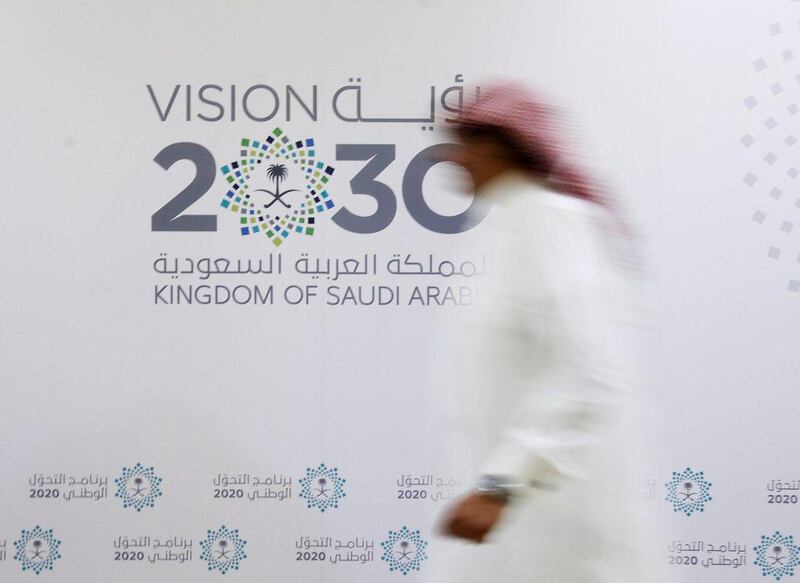Saudi Arabia plans to cut public-sector wages as well as subsidies by 2020, scaling back the state largess that helped ensure political loyalty in the largest Arab economy.
The Saudi cabinet approved the National Transformation Program, part of the Vision 2030 plan unveiled by deputy crown prince Mohammed bin Salman in April. Its targets include reducing public-sector wages to 40 per cent of spending by 2020, from 45 per cent today. Public debt is seen climbing to 30 per cent of economic output from 7.7 per cent currently.
The slump in oil revenue prompted prince Mohammed to lead the biggest economic shakeup in the kingdom’s history by seeking to reduce the reliance on hydrocarbons. He proposed measures eschewed by previous rulers, who used some of the windfall from oil exports over the past decade to create government jobs.
“The plan provides targets, but generally does not tell us how they will be met,” said Mohammed Abu Basha, a Cairo-based economist at regional investment bank EFG-Hermes Holding Company. “The drop in the wage bill is a surprise, that there will be a nominal cut by 5 per cent in the coming five years, especially when taking into consideration the expected elevated inflation.”
Encouraging Saudis to seek private-sector jobs has been a long-term challenge in the kingdom, where even after decades of attempts to diversify, more than 70 per cent of government revenue came from oil in 2015. The state still employs two-thirds of Saudi workers.
Speaking at a news conference to unveil the NTP, Saudi Civil Service minister Khalid bin Abdullah Al-Araj said public-sector employment remained more attractive to nationals because it offers “more job security” and benefits that include more vacation days.
The programme seeks to create 450,000 jobs in the private sector by 2020. The plans also aim to revamp industries such as healthcare, double the output of natural gas and increase the number of Saudi women in the workforce.
• Read the full National Transformation Program here
“In order for the jobs to be created in the private sector you need the transformation of the Saudi economy and this plan sets the dynamics for just that, “ Mario Maratheftis, global chief economist at Standard Chartered, told Bloomberg TV. “It’s not a five-year process, it’s a multi-decade process and it starts now.”
Prince Mohammed, who also plans to sell a stake in oil producer Saudi Arabian Oil Company and create the world’s largest sovereign wealth fund, wants to raise non-oil revenue to 530 billion riyals (Dh519bn) by 2020, more than triple the current figure.
That would be achieved through measures including raising the price of fuel and utilities as well as introducing a value-added tax. The NTP targets cutting water and electricity subsidies by 200bn riyals.
While the NTP lists initiatives to prepare and implement an income tax on residents, minister of state Mohammad bin Abdulmalik Al-Sheikh told reporters the government had no plans to impose levies on nationals or residents. He referred further questions to the finance ministry.
“Keeping the labour market and nationals happy will be essential, and in order to do that you have to keep creating jobs that people want to take,” Mr Maratheftis said.
Some analysts have questioned whether the government’s goal to boost non-oil revenue to 20 per cent of economic output by 2020, from 6 per cent, is realistic.
While Saudi foreign reserves remain among the world’s largest, lower oil prices have put the economy under more pressure than at any other time in the past decade. Net foreign assets are at a four-year low, and the IMF has projected a budget deficit of about 13.5 per cent of economic output this year.
To bolster its finances, the kingdom raised a $10bn loan in April and is weighing a first international bond sale of as much as $15bn, according to people familiar with the matter. It has slowed payments to contractors and suppliers, and is considering less conventional methods including IOUs to pay outstanding bills, the people said.
Moody’s Investors Service cut the kingdom’s sovereign rating last month for a second time this year, to A1 from Aa3, saying lower oil prices may cause a “material deterioration” in the nation’s credit profile. The kingdom’s credit rating was also lowered by Fitch Ratings and S&P Global Ratings earlier in 2016.
The government’s new programme targets raising the kingdom’s credit rating to Aa2.
Read the full National Transformation Program here.
business@thenational.ae
Follow The National's Business section on Twitter





